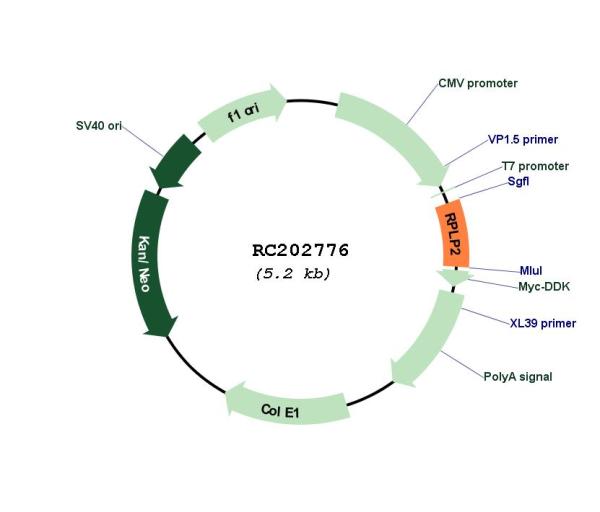RPLP2 (NM_001004) Human Tagged ORF Clone
CAT#: RC202776
RPLP2 (Myc-DDK-tagged)-Human ribosomal protein, large, P2 (RPLP2)
ORF Plasmid: tGFP
Lentiviral Particles: DDK w/ Puro mGFP w/ Puro
AAV Particle: DDK
"NM_001004" in other vectors (5)
Specifications
| Product Data | |
| Type | Human Tagged ORF Clone |
| Tag | Myc-DDK |
| Symbol | RPLP2 |
| Synonyms | D11S2243E; LP2; P2; RPP2 |
| Vector | pCMV6-Entry |
| E. coli Selection | Kanamycin (25 ug/mL) |
| Mammalian Cell Selection | Neomycin |
| Sequence Data |
>RC202776 representing NM_001004
Red=Cloning site Blue=ORF Green=Tags(s) TTTTGTAATACGACTCACTATAGGGCGGCCGGGAATTCGTCGACTGGATCCGGTACCGAGGAGATCTGCC GCCGCGATCGCC ATGCGCTACGTCGCCTCCTACCTGCTGGCTGCCCTAGGGGGCAACTCCTCCCCCAGCGCCAAGGACATCA AGAAGATCTTGGACAGCGTGGGTATCGAGGCGGACGACGACCGGCTCAACAAGGTTATCAGTGAGCTGAA TGGAAAAAACATTGAAGACGTCATTGCCCAGGGTATTGGCAAGCTTGCCAGTGTACCTGCTGGTGGGGCT GTAGCCGTCTCTGCTGCCCCAGGCTCTGCAGCCCCTGCTGCTGGTTCTGCCCCTGCTGCAGCAGAGGAGA AGAAAGATGAGAAGAAGGAGGAGTCTGAAGAGTCAGATGATGACATGGGATTTGGCCTTTTTGAT ACGCGTACGCGGCCGCTCGAGCAGAAACTCATCTCAGAAGAGGATCTGGCAGCAAATGATATCCTGGATT ACAAGGATGACGACGATAAGGTTTAA >RC202776 representing NM_001004
Red=Cloning site Green=Tags(s) MRYVASYLLAALGGNSSPSAKDIKKILDSVGIEADDDRLNKVISELNGKNIEDVIAQGIGKLASVPAGGA VAVSAAPGSAAPAAGSAPAAAEEKKDEKKEESEESDDDMGFGLFD TRTRPLEQKLISEEDLAANDILDYKDDDDKV |
| Chromatograms |
CHROMATOGRAMS
 Sequencher program is needed, download here. |
| Restriction Sites |
SgfI-MluI
Cloning Scheme for this gene
Plasmid Map

|
| ACCN | NM_001004 |
| ORF Size | 345 bp |
| OTI Disclaimer | The molecular sequence of this clone aligns with the gene accession number as a point of reference only. However, individual transcript sequences of the same gene can differ through naturally occurring variations (e.g. polymorphisms), each with its own valid existence. This clone is substantially in agreement with the reference, but a complete review of all prevailing variants is recommended prior to use. More info |
| OTI Annotation | This clone was engineered to express the complete ORF with an expression tag. Expression varies depending on the nature of the gene. |
| Product Components | The ORF clone is ion-exchange column purified and shipped in a 2D barcoded Matrix tube containing 10ug of transfection-ready, dried plasmid DNA (reconstitute with 100 ul of water). |
| Reconstitution | 1. Centrifuge at 5,000xg for 5min. 2. Carefully open the tube and add 100ul of sterile water to dissolve the DNA. 3. Close the tube and incubate for 10 minutes at room temperature. 4. Briefly vortex the tube and then do a quick spin (less than 5000xg) to concentrate the liquid at the bottom. 5. Store the suspended plasmid at -20°C. The DNA is stable for at least one year from date of shipping when stored at -20°C. |
| Reference Data | |
| RefSeq | NM_001004.4 |
| RefSeq Size | 511 bp |
| RefSeq ORF | 348 bp |
| Locus ID | 6181 |
| UniProt ID | P05387 |
| Cytogenetics | 11p15.5 |
| Domains | 60s_ribosomal |
| Protein Families | Druggable Genome |
| Protein Pathways | Ribosome |
| MW | 11.5 kDa |
| Gene Summary | Ribosomes, the organelles that catalyze protein synthesis, consist of a small 40S subunit and a large 60S subunit. Together these subunits are composed of 4 RNA species and approximately 80 structurally distinct proteins. This gene encodes a ribosomal phosphoprotein that is a component of the 60S subunit. The protein, which is a functional equivalent of the E. coli L7/L12 ribosomal protein, belongs to the L12P family of ribosomal proteins. It plays an important role in the elongation step of protein synthesis. Unlike most ribosomal proteins, which are basic, the encoded protein is acidic. Its C-terminal end is nearly identical to the C-terminal ends of the ribosomal phosphoproteins P0 and P1. The P2 protein can interact with P0 and P1 to form a pentameric complex consisting of P1 and P2 dimers, and a P0 monomer. The protein is located in the cytoplasm. As is typical for genes encoding ribosomal proteins, there are multiple processed pseudogenes of this gene dispersed through the genome. [provided by RefSeq, Jul 2008] |
Documents
| Product Manuals |
| FAQs |
| SDS |
Resources
Other Versions
| SKU | Description | Size | Price |
|---|---|---|---|
| RC202776L3 | Lenti-ORF clone of RPLP2 (Myc-DDK-tagged)-Human ribosomal protein, large, P2 (RPLP2) |
USD 450.00 |
|
| RC202776L4 | Lenti-ORF clone of RPLP2 (mGFP-tagged)-Human ribosomal protein, large, P2 (RPLP2) |
USD 450.00 |
|
| RG202776 | RPLP2 (tGFP-tagged) - Human ribosomal protein, large, P2 (RPLP2) |
USD 350.00 |
|
| SC119511 | RPLP2 (untagged)-Human ribosomal protein, large, P2 (RPLP2) |
USD 150.00 |
|
| SC320833 | RPLP2 (untagged)-Human ribosomal protein, large, P2 (RPLP2) |
USD 150.00 |
{0} Product Review(s)
Be the first one to submit a review






























































































































































































































































 Germany
Germany
 Japan
Japan
 United Kingdom
United Kingdom
 China
China




